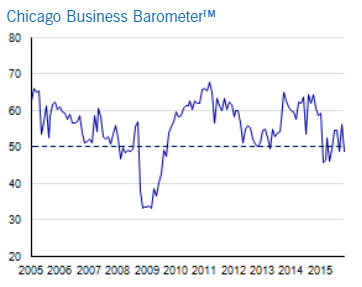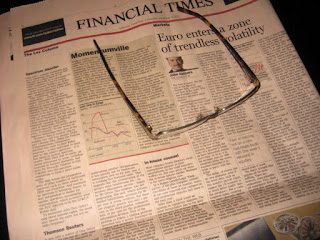
There's an article in
Barron's this week: "So Much, for So Long, for So Little."
It's a cute play on Winston Churchill's famous quote, but nonetheless it's appropriate.
Back in the 1970s then President Nixon declared war on cancer. Since then, though many in the industry will deny it, we've made some but really relatively few advances. In the interim we've tossed enough money down that black hole with very little bang for the bucks.
In fact, if one were a money manager with those feeble results he would've been fired long ago. That in essence is the crux of the Barron's piece.
America has received little bang for trillions of bucks put toward economic recovery. With so much time passed and money spent, we must recognize that the problem is more fundamental than a crisis.
The third quarter’s gross-domestic-product data show another lackluster annualized increase of 2.1%, giving 2015 an annualized average growth of 2.2% over three quarters. That indicates the U.S. economy remains mired in mediocrity. The economy has been limping along in low gear for years now.
As the author rightly notes, there's been a few quarter outliers, but that's exactly what they were, exceptions not the rule. This next part is what we agree with the most.
Eight years’ worth of subpar performance has lulled the U.S. into deeming it normal. What was acceptable immediately after the crisis has evolved into nonrecovery. Now, years later, the U.S. has a new normal.
An October poll conducted by the Associated Press and the German research institute GfK showed just how deeply Americans have come to accept the current economy, and how little they expect it to change.
The economy was rated “extremely or very important by 83% of respondents—the highest by at least 18 percentage points of the six issues polled. When asked to describe today’s economy, its total “poor” rating was 54%. When asked whether the economy had improved over the past month, 21% said it had worsened and 60% said it remained the same. Twenty-five percent also expected their family’s financial situation to worsen over the next year, with 44% thinking it would stay the same.
We have lost sight of the obvious. First, the U.S. spent an enormous, unprecedented amount, using both fiscal and monetary policy in pursuit of recovery. Second, and more importantly, it has not worked.
On the monetary-policy front, the Federal Reserve’s balance sheet was roughly $900 billion in 2008, as the financial crisis hit the economy. When the Fed’s purchasing operations ended in October 2015, the balance sheet was about five times greater—approximately $4.5 trillion—the result of several rounds of quantitative easing, which injected unprecedented monetary stimulus into the economy and brought interest rates to roughly 0%, where they still stand.
On the fiscal-policy side, the effort also has been extreme. Federal debt held by the public measured $5.8 trillion in 2008. In 2014, according to the Office of Management and Budget, it was $12.8 trillion. That is a 121% increase, and it’s 74.1% of GDP, the highest level since 1950.
There's more here, but we'll conclude with this quote from the author:
The past seven years of stimulus from the public sector have been unable to compensate for what is lacking in the economy's more productive private sector. The private sector now is siphoned, shackled and stunted. When what is needed is for it to do more, it can no longer do as much.









